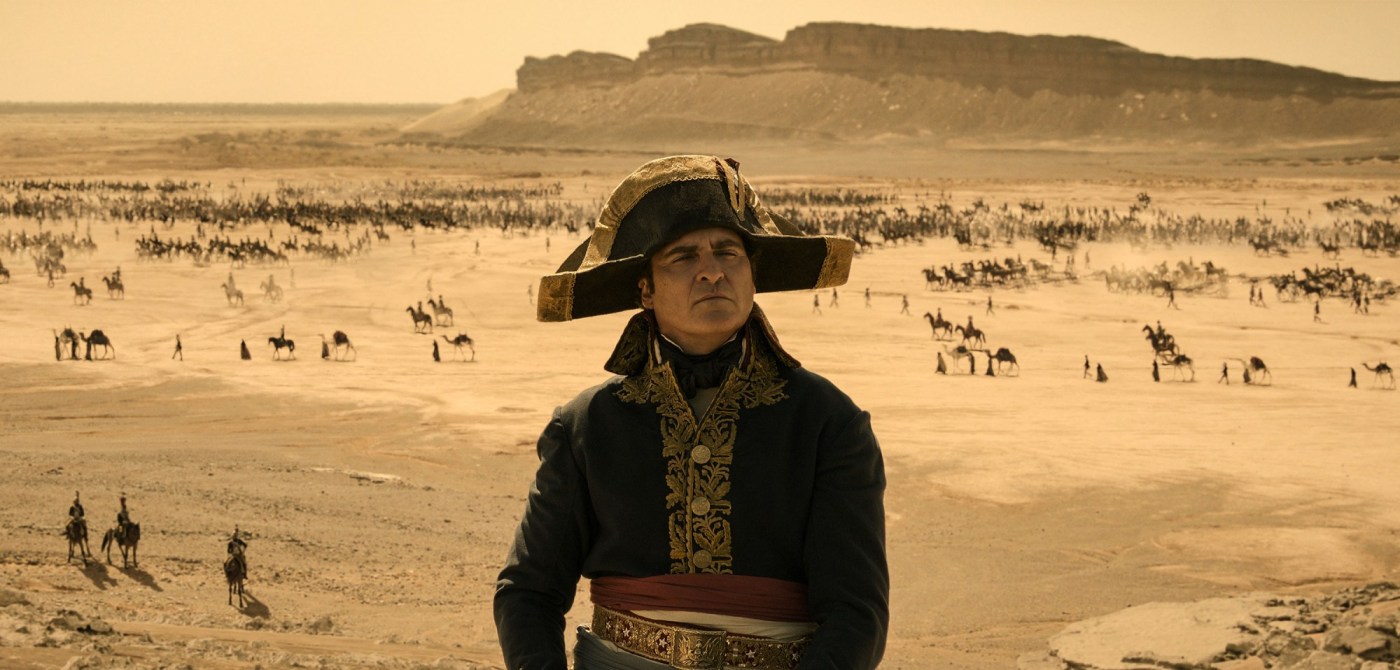
Movie review: Joaquin Phoenix meets his Waterloo in ‘Napoleon’
The literal French definition of “tour de force,” an admiring noun that gets thrown around a lot in English, translates as “feat of strength.”
Therefore I don’t get it. I don’t get why Joaquin Phoenix’s take on Napoleon Bonaparte, Emperor of France and frequent film subject, might inspire anyone to characterize the results as a tour de anything, except a feat of sustained, occasionally droll indecision.
The same goes for director Ridley Scott’s middling epic “Napoleon.” “Middling” and “epic” are not words you want to see together, but there you are. Napoleon was many things, and with this dutiful career highlights reel, Phoenix and his director deliver glancing blows to as many aspects of the warrior-tyrant-genius-fool-lonely heart as cinematically possible in two and a half hours.
Scott’s plan for the eventual Apple TV+ airing of “Napoleon” will restore 90 minutes and likely a battle or three. Will it make for a better experience? Probably. Scott has alluded to his frustration in trimming down Vanessa Kirby’s scenes as Joséphine de Beauharnais, a first wife ultimately divorced and banished but Napoleon’s great love to the very end. She’s the best thing in a busy blur of a movie. While Phoenix tries a little of this and that as he searches for a through-line to the screenplay, Kirby gives this oddly impersonal project a human pulse.
Even in a lesser Ridley Scott movie, you can count on a certain amount of visual intelligence and drive. “Napoleon” has both, in lurches. In the Battle of Austerlitz sequence, we see the methodical lead-up and tactically fiendish outcome of the French army’s cannons aimed at an ice-covered lake, sending the retreating Russian and Austrian soldiers to a cold, wet grave.
Later in the Napoleonic Wars, and in the movie, the overreaching Napoleon meets his Waterloo at Waterloo (no better place for it, of course) against the British. Here director Scott manages some size and tension the old-fashioned way: by getting us a little further into the strategies and reflections of the adversaries, Napoleon and the Duke of Wellington (Rupert Everett, most welcome), while a wider landscape awaits thousands of colliding, dying soldiers and Fate deals our antihero a decisive blow.
It’s a movie of men, horses, digital blood bursts and practical craftsmanship. All that’s interwoven with Napoleon and Josephine’s courtship (sort of) and marriage (full of psychosexual power plays and a smidgen of kink). Screenwriter David Scarpa’s nuttier lines of dialogue are all over social media already, notably a feasting Napoleon’s gluttonous declaration — “Destiny has brought me this lamb chop!” — and his petulant playground lament about his British enemies: “You think you’re so great because you have boats!”
“Napoleon,” starring Joaquin Phoenix, premieres in theaters around the world on Wednesday. (Kevin Baker/AppleTV+/TNS)
I don’t know what’s French for “these are the jokes, folks,” but … actually I do, it’s “ce sont les blagues, les amis,” but that’s irrelevant. At times “Napoleon” goes for it, gagwise, and from beginning to end it paints the man’s ambitions and insecurities, both petty and grand, with a broad brush. But Scott has never been a particularly witty director, especially (ironically) with comedies. And while “Napoleon” isn’t a spoof or a comic dismantling of a legend, its sense of humor is an uncertain thing indeed, matched by Scott’s frustrating uncertainty in crucial visual decisions.
A typical 20 seconds of action footage here combines glam slow-motion, slightly sped-up and frazzled fast-motion, digital futzing (always another digital crowd of soldiers, or revolting peasants, or something) plus real people in real costumes, in seemingly random shuffle mode. The movie made me long for the one Scott made 46 years ago on a tight budget, likewise set during the Napoleonic Wars: “The Duellists.” Too much of this project feels as if no one in particular directed it, and as if a miscast top-shelf actor never figured out how to play the guy.
Phoenix is so excitingly unpredictable and vital in all kinds of movies, from “Walk the Line” to “Her” to “The Master.” Therefore his muttering sleepy-time interpretation of Napoleon comes as a letdown, and the flat, no-accent cadence of his verbal delivery takes us out of the period. Only in sporadic bursts — there’s a moment when Phoenix whops a glass out of a servant’s hand, smashing it, and it’s more arresting than most of the battle scenes — do we feel we’re getting somewhere.
As for the historical inaccuracies: Who cares? Honestly. Who cares? No, Napoleon didn’t actually take aim and fire cannonballs at the Great Pyramids of Egypt; no, he didn’t actually have a sit-down with Wellington after his defeat; no, he didn’t witness Marie Antoinette’s execution. Doesn’t matter to me. What matters to me are the whats and the whys of this imagining of Bonaparte. Why tell this story? What does this subject have to say about his time? What is “Napoleon” trying to capture in our own time, in its filmmaking methods and approach?
More fulfilling answers may be forthcoming in the four-hour version. I know only this: Whatever Everett got paid to sniff the line “I don’t get wet if I can help it,” while dealing with an umbrella prior to the Battle of Waterloo, it wasn’t enough.
__________
‘NAPOLEON’
2 stars (out of 4)
MPA rating: R (for strong violence, some grisly images, sexual content, and brief language)
Running time: 2:38
How to watch: Premieres in theaters Nov. 21; Apple TV+ streaming date not yet announced.
__________
©2023 Chicago Tribune. Visit at chicagotribune.com. Distributed by Tribune Content Agency, LLC.


